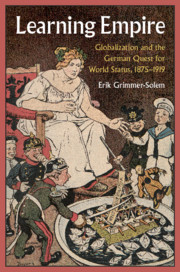
-
Select format
-
- Publisher:
- Cambridge University Press
- Publication date:
- 20 September 2019
- 26 September 2019
- ISBN:
- 9781108593908
- 9781108483827
- 9781108705158
- Dimensions:
- (228 x 152 mm)
- Weight & Pages:
- 1.19kg, 668 Pages
- Dimensions:
- (229 x 152 mm)
- Weight & Pages:
- 0.957kg, 670 Pages
You may already have access via personal or institutional login
Book description
The First World War marked the end point of a process of German globalization that began in the 1870s, well before Germany acquired a colonial empire or extensive overseas commercial interests. Structured around the figures of five influential economists who shaped the German political landscape, Learning Empire explores how their overseas experiences shaped public perceptions of the world and Germany's place in it. These men helped define a German liberal imperialism that came to influence the 'world policy' (Weltpolitik) of Kaiser Wilhelm, Chancellor Bülow, and Admiral Tirpitz. They devised naval propaganda, reshaped Reichstag politics, were involved in colonial and financial reforms, and helped define the debate over war aims in the First World War. Looking closely at German worldwide entanglements, Learning Empire recasts how we interpret German imperialism, the origins of the First World War, and the rise of Nazism, inviting reflection on the challenges of globalization in the current century.
Reviews
'The history of Imperial Germany is currently being re-written, and Learning Empire is the most sustained and profound intervention yet: A magisterial tour-de-force that establishes Germany as a global player in the decades before World War I. Meticulously documented and driven by a strong vision, it reinstates the middle classes, and economic specialists in particular, as the driving forces behind Germany’s global quest. Impressive!'
Sebastian Conrad - Freie Universität Berlin
'Erik Grimmer-Solem's new book is a sustained tour de force of integrated intellectual and political history, whose impact will surely shift our perspectives on the complicated meanings of the ‘German question’ for the transnational instabilities of global politics in the late nineteenth and early twentieth centuries.'
Geoff Eley - University of Michigan
‘Deeply researched and clearly written, Learning Empire gives afresh account of the origins and development of Weltpolitik by placing it in the context of global economic competition-what Germans in 1900 called Weltwirtschaft-rather than inthe usual framework of national and domestic politics … this reviewer finds Learning Empire to be one of the most important books to appear in the German field in the last twenty years.’
Jennifer Jenkins Source: H-Diplo
‘… [T]he book provides a thorough exploration of how six figures’ economic thought shaped political and public debate over Germany’s role in the world. The book also makes clear the distinctive elements of German understandings of empire that built on foreign trade, investment abroad, and informal economic spheres of influence. By paying attention to economists alongside other well-researched figures like missionaries or politicians, Grimmer-Solem brings a richer texture to the scholarship on global economics and capitalism in Imperial Germany.’
Heidi Tworek Source: Business History Review
‘With his book Learning Empire, Erik Grimmer-Solem now provides another exciting perspective which finally puts the phenomenon of globalization in the second half of the nineteenth century into the wider context of the long-dominant view of Germany’s outrageous ‘grab’ for world power.’
Andreas Rose Source: German Historical Institute London Bulletin
‘… [Learning Empire] is a great success, in two senses. First, the book is a gold-mine of information about the experiences abroad of an influential network primarily of academic economists, but also of some key political figures who would come to play central roles in Weltpolitik. The collective picture that emerges here of a group of men influenced by their extensive international experiences is quite striking and persuasive. Second, Grimmer-Solem convincingly points to the 'smoking guns' that link those figures to the evolution of German imperial policy – in private letters, in political and academic appointments, in memoirs, in the details of publication histories of studies of the economics of various parts of the world, and so on.’
Edward Ross Dickinson Source: Journal of World History
‘This book is a remarkable achievement. It succeeds admirably in tracing the imperial imaginary of liberal nationalist political economists and making it and the lineaments of a new age of global politics and economics central to German policymaking, thereby providing a new narrative of the trajectory of German imperialism in the late nineteenth and early twentieth centuries.’
Dirk Bonker Source: German Studies Review
‘Learning Empire is a revisionist work that expands the study of German empire beyond its traditional focus on colonies in Africa and the South Pacific and into the arena of international trade.’
Jennifer Jenkins Source: H-Diplo
‘… one of the most important books to appear in the German field in the last twenty years. It revises and re-envisions many of the turning points that defined foreign and domestic policy …’
Jennifer L. Jenkins Source: H-Net Reviews
‘… a compelling, substantial work.'
J. P. Short Source: H-German
Contents
Metrics
Altmetric attention score
Full text views
Full text views help Loading metrics...
Loading metrics...
* Views captured on Cambridge Core between #date#. This data will be updated every 24 hours.
Usage data cannot currently be displayed.
Accessibility standard: Unknown
Why this information is here
This section outlines the accessibility features of this content - including support for screen readers, full keyboard navigation and high-contrast display options. This may not be relevant for you.
Accessibility Information
Accessibility compliance for the PDF of this book is currently unknown and may be updated in the future.


